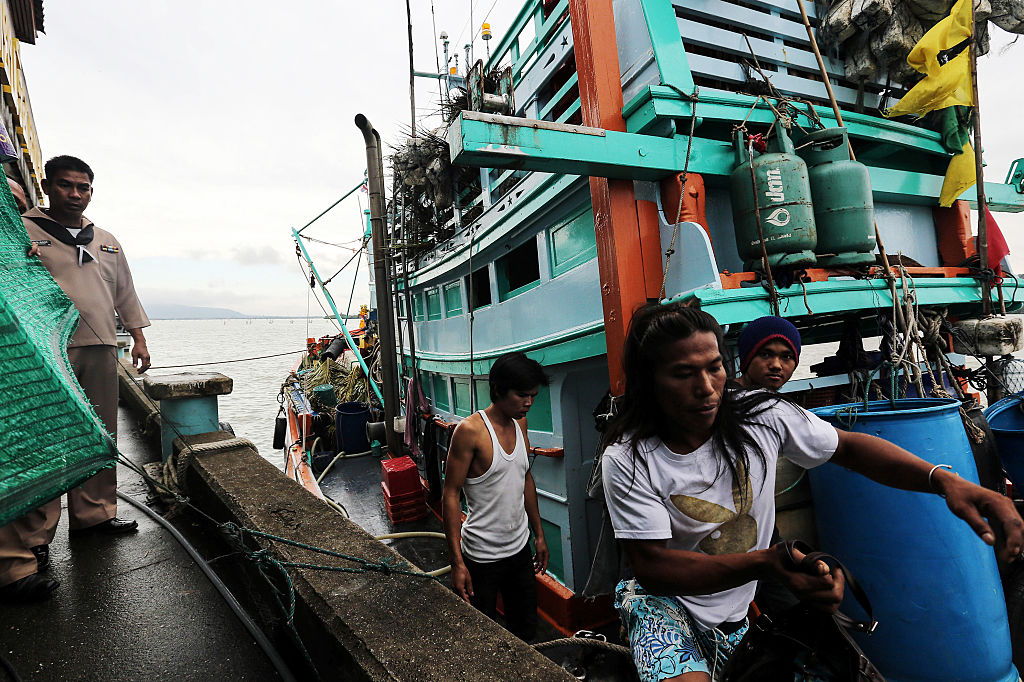
Tuesday is the U.N.’s World Day Against Trafficking in Persons. After nearly two decades of international commitment to end modern slavery, one thing is clear: States are simply not doing enough. It is estimated that there are 40.3 million victims of modern slavery, including sex trafficking and forced marriage. Eighty percent are victims of forced labor — a problem that is poorly understood by the general public. Twenty-five percent of trafficking victims worldwide are children.
Human trafficking is an epidemic in and of itself. But it’s also a symptom of other deeply-rooted, international challenges — the refugee crisis, civil conflict, poverty, and more. This is a generally accepted truth. But there’s another root cause that is rarely, if ever, discussed: authoritarianism.
Each year, the U.S. State Department releases a trafficking report that categorizes countries according to the strength of their anti-trafficking efforts. There are four categories: Tier 1, Tier 2, Tier 2 Watchlist, and Tier 3. For a country to be categorized as Tier 1, its government should have gone above and beyond in prosecuting traffickers, protecting victims, preventing new trafficking cases, and partnering with civil society to come up with new solutions. In this year’s report, published in June, 94% of Tier 1 countries have democratic governments. Meanwhile, just 6% of ranked authoritarian states make it into that category. Tier 3’s list is 90% authoritarian and 10% democratic.
The correlation is clear, and, as the Human Rights Foundation notes, persists from year to year. Yet few anti-trafficking experts and advocates discuss the relationship between weak anti-trafficking policies and authoritarianism. This year’s trafficking report urges governments to “look inward” to address trafficking within their own borders making it distinct from past reports. Doing so requires transparency, accountability, the rule of law, and free and public discourse — rare resources under authoritarian regimes. Yet the words “democracy” and “authoritarianism” are never even mentioned in the State Department’s report. And this oversight is not new: Year after year, the report fails to discuss how authoritarianism contributes to human trafficking.
Take Thailand, for example. This year’s trafficking report ranks Thailand in Tier 2, among authoritarian states like Zimbabwe and Tajikistan, as well as democracies like Germany and Denmark. But even as Thailand has “increased efforts” in anti-trafficking, its military junta has increased repression as well, shutting down opposition media outlets, expanding censorship, and prosecuting hundreds of dissidents.
In a climate where advocates are ruthlessly silenced, anti-trafficking reforms have been implemented top down, without consultation from the community. As the rule of law weakens, the country has convicted fewer traffickers and launched a paltry number of investigations. And with recent mass arrests of protesters and ongoing criminal trials against activists, it’s unlikely that victims or their advocates feel able to push for the full implementation of reforms.
The international community has been able to pressure Thailand to address trafficking. For example, after the Guardian’s damning 2014 investigation about slavery in the fishing industry, the Thai government increased its efforts to combat labor trafficking, even creating a new court dedicated to addressing human trafficking. But without deeper, institutional change, the effects were short-lived.
Lasting change would require upending the Thai court system entirely to re-establish rule of law; engaging civil society and victims of trafficking directly to learn from their experiences; and reforming the electoral system so government representatives are truly accountable to voters. In the absence of this systemic reform, slavery continues to be rampant in the Thai fishing industry, and recent government-run investigations into trafficking are no more than a “theatrical exercise for international consumption,” according to Human Rights Watch.
But is this really a surprise? Why would we expect a country ranked “Not Free” by Freedom House for the last five years to do right by its citizens?
As advocates, we often discuss global challenges as if they are unconnected to political systems. The U.N.’s Sustainable Development Goals, for example, make no mention of democracy or basic freedoms like free expression. Yet authoritarianism both causes and exacerbates many of global development crises. According to the Human Rights Foundation’s research, 25 of the 30 poorest countries are ruled by authoritarian regimes; 96% of the world’s refugees in 2017 came from countries with authoritarian regimes; and of the 20 countries in the world with the worst access to basic drinking water, 18 are ruled by authoritarian regimes. Promoting democracy can pave the way to change.
At the 2019 Oslo Freedom Forum, former U.N. human rights chief Zeid Ra’ad al Hussein urged the human rights community to work together to defend all rights and freedoms equally — not just because the rights to free expression, assembly, and association are fundamental, but because collaborating makes us stronger. If we don’t unite, if we don’t recognize the connection between issues like trafficking and authoritarianism, he says, “we will never have the density within the movement, the strength within the movement, to overcome the dangers that exist before us.”
Every year on this day we talk about what we’re doing to end modern slavery. But clearly, we’re not doing enough. If we really want to end human trafficking, we need to work together to empower its victims by advocating fundamental rights. Democracy must be a part of the conversation.
More Must-Reads from TIME
- Why Biden Dropped Out
- Ukraine’s Plan to Survive Trump
- The Rise of a New Kind of Parenting Guru
- The Chaos and Commotion of the RNC in Photos
- Why We All Have a Stake in Twisters’ Success
- 8 Eating Habits That Actually Improve Your Sleep
- Welcome to the Noah Lyles Olympics
- Get Our Paris Olympics Newsletter in Your Inbox
Contact us at letters@time.com